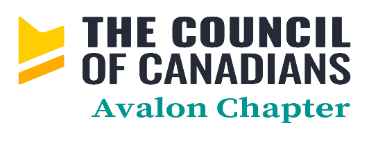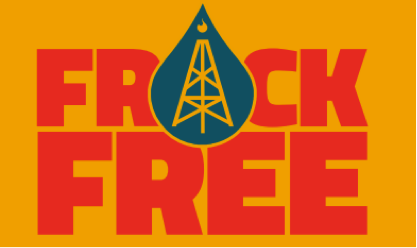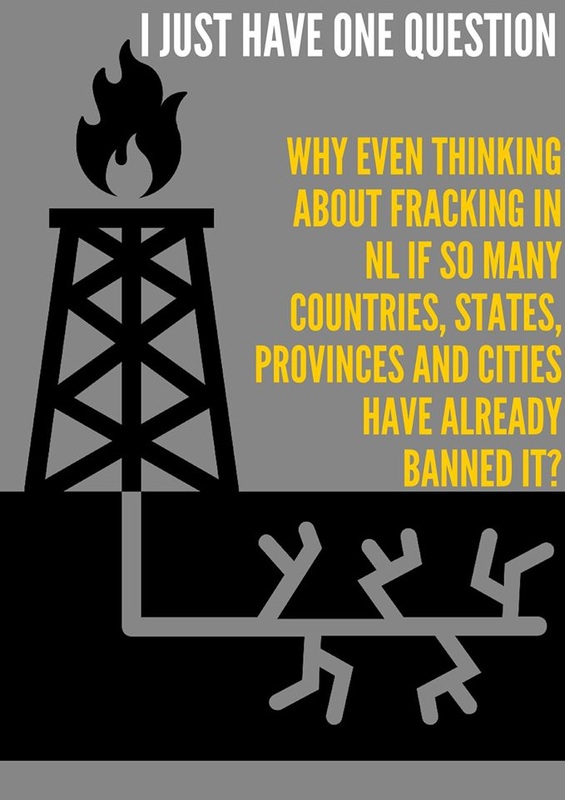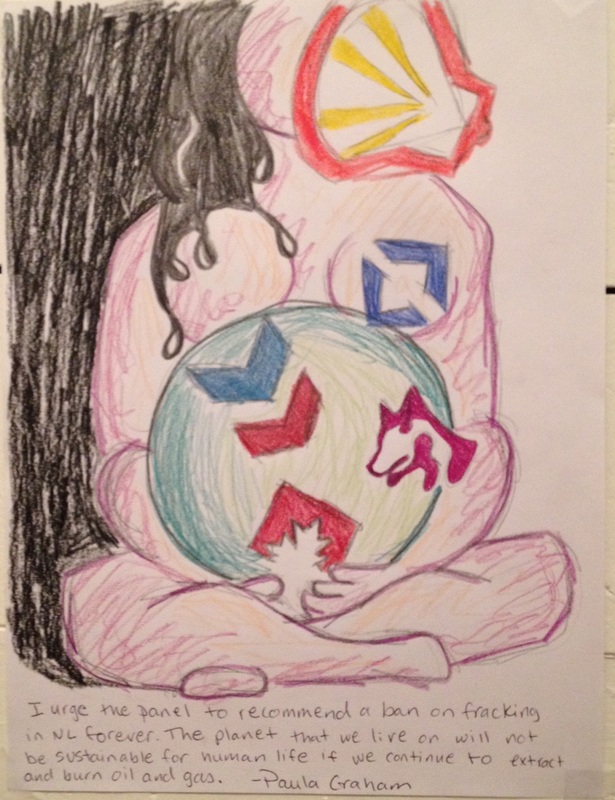|
The NL fracking review panel has been accepting public submissions. Our chapter, and individual members, made wonderful submissions! If you'd like to make one, you can still do so at http://nlhfrp.ca/submit-feedback-to-the-panel/submissions/ Here is the submission from our St. John's chapter of the Council of Canadians: To the NL Hydraulic Fracturing Review Panel: The St. John’s chapter of the Council of Canadians echoes the growing number of groups outspoken in their demand for a full fracking ban in Newfoundland and Labrador. There is no safe way to frack, and the lack of scientific consensus on the issue led the Nova Scotia fracking review panel last year to conclude that fracking should not go ahead in their province. The lack of planning around waste waster management and community consultation were some key concerns that led to the decision to extend their fracking moratorium. Two of our five-member panel were also on the Nova Scotia panel, so we wonder how the same pool of evidence (with its gaps in the areas of human health impacts over the long term and general lack of social license across the Atlantic region) could magically yield a different conclusion for fracking in our province. Moreover, the unique geology on the west coast of Newfoundland adds another knowledge gap for our panel to contend with. The recently released Hinchey study looks at the geology of the Green Point shale, reiterating the lack of information we have of the areas coveted by fracking companies. The study states: “There is currently no way to reliably and accurately depict or predict the extent, location, rock characteristics or shape of Green Point Shale layers below the surface. It is therefore, not feasible to present a model for unconventional shale gas/oil exploration in the area.” (Hinchey, Knight, Kilfoil and Hicks, 2015, 166) http://www.nr.gov.nl.ca/nr/mines/geoscience/publications/currentresearch/2015/Hinchey-A-2015.pdf The complexity of the rock formations and the near total ignorance of the shale formations of Western Newfoundland make the prospect of fracking even more reckless. At the very least, a precautionary approach to resource development would extend the moratorium in light of our best geologists acknowledging they know almost nothing about the proposed area. But despite how obvious and compelling these gaps in our knowledge should be in the decision-making process, it’s easy to cherry-pick studies that will allow you to conclude that, with enough regulation and technological know-how, fracking can potentially be done safely. We have seen devastating and irreversible damage actually (not potentially) done by the fracking industry: drinking water contamination, people getting sick from flaring near schools and residential areas, the proliferation of earthquakes, the slow release of toxins from tailings ponds that contain wastewater no one knows what to do with. Fracking has already caused enough irreversible damage and produced enough wastewater that it doesn’t have a plan for (especially in Nova Scotia) – why should Newfoundlanders and Labradorians trust the hypothetical scenarios offered by people with vested interests in fracking on how stringent their regulations will be? It is not up to people to prove to industry that fracking is unsafe; it is up to those who want to impose themselves on our landscape and communities via dangerous unconventional methods of extreme energy to prove to us that it can be done safely. Fracking will never be done safely, for the simple reason that pumping millions of litres of unknown chemical soup and water at high pressures deep underground, traversing aquifers, and using explosives to create fissures in sensitive geological formations will always have a huge degree of risk on human wellbeing. Groundwater contamination, earthquakes, and human health impacts are very real consequences of taking those risks. The people of western Newfoundland have clearly not given their social license to this industry, for the obvious reason that these risks are not worth the few jobs and temporary monetary gains they might bring to the area. Moratoria have swept the Atlantic region. Quebec, Nova Scotia, and New Brunswick have all said ‘no’ to fracking. Instead of feeding our harmful dependence on fossil fuels, the provincial government must seize the opportunity to transition to renewable forms of energy, and have some foresight into where the rest of the world is headed in the face of catastrophic climate change. Please also include the following articles on your website for consideration. They have important things to add on the financial risks of fracking:
Jimena's graphic! Paula's and Erika's submissions, created during the NL Fracking Submission Writing Parties: And Ken Kavanagh's amazing submission to the NLHFRP! Submission to NL Hydraulic Fracturing Review Panel
BY Kenneth J. Kavanagh, Bell Island June 1, 2015 “The health of the people is the highest law.” (Cicero 106 – 43 B.C.) Introduction As a concerned and engaged citizen who believes in the power of the people inherent in a true democracy, as a retired educator who believes in the power of knowledge and as a parent of four (4) children who feels an obligation to leave a safer and sustainable world for future generations, I wish to express my personal and strongly-held views with respect to the matter of fracking and the Newfoundland and Labrador Hydraulic Fracturing Review Panel (NLHRP) and process. My submission will likely not deal with much of the specific terms of reference of the review panel. I have been reading many of the submissions and am very impressed with the breadth and depth of coverage of the major concerns and questions about hydraulic fracturing. I am quite impressed and confident that all that needs to be said will be said. This submission is my response and opinion to fracking in NL. Why did the NL Government Establish this Panel I want to begin by commenting on the Newfoundland and Labrador government’s motivation for establishing this so-called independent panel and review process. I do this knowing that you will likely take the position that such comments are irrelevant and, in any event, not something that you can comment on or consider in terms of your final report. I may have to concede on the second point but not the first. Hydraulic Fracturing is a very controversial issue and a public review process is just that. It is a public process for the public to express its collective views and thoughts on the matter. While you may be constrained by the terms of reference imposed on you by government, I reserve the right not to be and to comment on all aspects of this issue. I believe this government has been pro fracking all along. From the time that people in the Port aux Port/Bay St. George area began to oppose the prospects of fracking, the government has dismissed, trivialized and denigrated the concerns expressed by a significant portion of the population and generally held a favourable and positive position on the controversial extraction technique. In particular, government Ministers and MHA s have tried to use their clout and influence to dismiss the criticism and soft peddle no-worry and pro-industry view of fracking. The best example of this was Tom Marshall, a very powerful MHA from the area who was the Natural Resources Minister and then became the interim Premier for a few months in early 2014. During a public meeting on the Port aux Port Peninsula, Marshall showed up with a few suits from his Department, waving a stack of papers and thought he was going to quash the growing opposition to the fracking plans on the West Coast by the sheer weight of his political and personal standing in the area. He got a rude awakening with a strong backlash from the residents at the session. In one exasperated exchange with a critic, he uttered: "I don't care what anybody in this room says to me, I'm going to do the right thing." Then in a subtle and insulting attempt, he trotted off to Weyburn, Saskatchewan, the headquarters of fracking in Canada and came back with a rosy expose of what he experienced. “They are not having any problems with it at all,” said Marshall according to a Western Star story. In the same story he was quoted as saying: “They haven’t had any water contamination, they haven’t had any problems with water volume, they haven’t had livestock dying, they haven’t had earthquakes.” Once again, Mr. Marshall was surprised and a tad upset at the backlash to his superficial positive framing of his fact-finding trip to Saskatchewan. He was called on his feeble attempt to sell a fake bill of goods to the community and the community told him so. I believe it was at this seminal point that both Mr. Marshall and the government realized that it would take a more long term and sophisticated strategy to bring the masses in to compliance with the wishes of the government and the industry. Every move since then on this file has been part of that sophisticated strategy. First there was the October 2013 move to close the door on accepting any fracking applications pending an internal review. The media and most people referred to the move as a ‘moratorium’ which was not really the case but government was in no rush to correct the perception and bit of positive publicity that ensued. Eventually, there would be the announcement of an external review. In the meantime, the individuals and groups involved with the Port aux Port/Bay St. George Fracking Awareness group stepped up their efforts with their information and public awareness campaign. Armed with a keener awareness of the many controversial issues around fracking, public concern and opposition was growing across the entire province. All during this time, this government’s popularity with the NL electorate was plummeting. Premier Kathy Dunderdale stepped down and the PC Party went through a disastrous leadership with two contenders backing out and the eventual acclaimed winner, Frank Coleman, rejecting the position of Premier just days before assuming office. The ensuing leadership contest had its own controversial ending but the present Premier, Paul Davis, emerged the victor. By the time Paul Davis took over, this government had lost seven (7) by-elections, including the extraordinary total swing of 89.7 percentage points from the PCs to the Liberals in Mr. Tom Marshall’s former district of Humber East. In this context, Minister Dalley appointed this Hydraulic Fracturing Review Panel on October 10, 2014. So let’s call a spade a spade here. The appointment of a so-called external, independent review panel is not the result of some ‘on the road to Damascus’ enlightenment and realization that hydraulic fracturing is fraught with risk and danger and that the public must have a voice in decision as to whether it will be allowed to happen or not. No, it was a decision made ‘on the road to low polling numbers.’ With all due respect to the members of this Panel, the appointment of this Review Panel is nothing more than a desperate, crude, and - ultimately foolhardy attempt - to reverse plummeting political fortunes by moving the highly volatile and controversial public discourse on hydraulic fracturing away from the government to another body whose report would not be ready prior to the next election. It was also meant to have the dual benefit of placating the opposing public. The establishment of the Review Panel has another built-in ‘defense mechanism’ I shall refer to next. The Independence of the Panel When Minister Derrick Dalley appointed this Panel on October 10, 2014, he claimed: “Our government listened to concerned citizens and industry stakeholders and selected an independent panel...” He may have listened to the industry stakeholders but he certainly has not listened to concerned citizens, It would seem the ‘independence’ is somewhat like ‘beauty’ and is in the ‘eye of the beholder!’ Some or all of the panelists may claim their independence! I am not sure as I have not heard any of them state that publically or pledge any intention to do so. The Minister who appointed the panelists claims they are and has publicly stated that he has faith in them. That may well be but then the question becomes who has faith in the Minister. I don’t and I would strongly suspect that would be true of a large segment of the electorate. Clearly, there are many citizens who question the independence of this panel, including the concerned citizens of the Fracking Awareness Network of the West Coast. Just recently more than a dozen groups on the east coast of the province held a press conference and also expressed similar concerns with respect to the panel’s independence. I, too, respectively question their independence. Among other things, I base my opinion on the following public comments made by various panelists. Mr. Graham Gagnon (a panelist with the Wheeler Review Panel), in the September 4, 2014 edition of the Chronicle Herald, expressed surprise and disappointment that the NS government issued a ban on fracking so soon after the release of the Wheeler report. In the meantime the report recommended such a ban. At one point in the article, Mr. Gagnon says he believes “the fracking of shale gas, like coal mining or gold mining, carries some risks, but if regulated and closely monitored, it is not going to create drastic environmental problems.” He finishes by saying: “I don’t think the concerns that are there are necessarily showstoppers.” In the January 31, 2014 edition of the Western Star, the following quote is attributed to Mr. Maurice Dusseault: “There are many people who are taking a position that fracturing is inherently bad and what I’m saying is that the process of hydraulic fracturing is not much riskier than other industrial practices.” He asserted that it’s a practice that, if done properly, can be done safely. He went on to dispute information to the contrary. Then we have the following quote by our own Mr. Wade Locke in the September 12, 2014 edition of the Telegram under the banner of “Economist says objectivity crucial for fracking review”: “Just as it would be terrible for an environmental disaster to result from fracking, it would be tragic for a major economic opportunity to be lost because of an ill-formed appeal to emotion. I just hope the opportunities here (in Western Newfoundland) are realized to their fullest potential.” These are clear and emphatic statements that do not point to objectivity and independence. I give the panel high marks on transparency as some of its members did declare their bias. The most disappointing and insulting comment was by Mr. Locke. As a typical mainstream economist, he may wish to deal in numbers of widgets produced, GDP, interest and exchange rates, supply and demand trends and so on. In the meantime, citizens of this province have a right to ask questions – even in an emotional and passionate manner – and expect answers. They especially have this right in the case of a project in their backyard involving an unconventional extraction technique that is yet unproven and can have irreparable harm on the health of persons and the environment. In my mind, and in the minds of many Newfoundlanders and Labradoreans, this panel is anything but an objective and independent panel. Unlike the Nova Scotia fracking review panel, where citizens actually had input into the panel composition, this panel of 5 men was appointed by a government that is very much pro-fracking but desperate to lift itself out of the polling doldrums in time for the next provincial election. So whether you are aware or admit or accept it, this panel is neither what was promised nor what the people of this province are entitled to in order to review such a critical and controversial matter of public policy. The Panel is a tool of this government with the dual purpose of deferring and deflecting negative publicity yet assuring its corporate friends that fracking will come to pass. A Provincial Concern Not a Regional One It is perhaps another sign of the myopic and self-serving motive of the government, but the most disappointing aspect of the Terms of Reference is the confinement of the issue to a review of fracking specifically as it relates to a potential project in Western Newfoundland. The comprehensive review done in Nova Scotia was provincial in scope. In fact the NS review, though not perfect, was substantially better that the NL review process. It had a more complete and comprehensive set of Terms of Reference. It had an 11-member panel with much broader expertise and experience, and appointed with input from the public. And it had several opportunities for input by citizens including 11 public consultation sessions across the entire province. On the matter of public consultations, I believe it is an insult to the citizens in every corner of this province not to have an opportunity to appear before this panel to express their concerns and fears about the real and/or potential impacts of fracking on them, their communities and the environment. Even if the basic fracking activity is confined to the West Coast, certain aspects of the project could involve other parts of the province such as in the storing of fracking waste water. The most important principle here though is that every citizen owns this province and every citizen has an interest in and a responsibility for all aspects of this province. I may not belong to the Port au Port Peninsula, but I have a responsibility to worry about my fellow citizens and what may be happening to the environment in that area. This matter is a ‘we’ matter and this panel must allow residents of every part of the province to have a reasonable opportunity to have a voice. Concluding Remarks Hydraulic fracturing or ‘fracking’ is an unconventional, controversial and dangerous oil/gas extraction technique. Industry proponents, most politicians and some citizens (including some on this panel) like to argue that there is no proof of harm! I disagree. I think there is ample proof of harm but for those who might wish to cling to this self-serving and baseless argument, let me offer the wise words of Caleb Behn, an indigenous lawyer: “Absence of proof of harm is not absence of harm!” Furthermore, I believe that when it comes to the matter of fracking, the “Precautionary Principle” or what the Wheeler Report referred to as the “Precautionary Approach,” must apply. This principle is an established principle contained in the final declaration of the UN Conference in Environment and Development. Fundamentally, it would call for the burden of proof on avoiding public harm to rest with the developers and governments who wish to pursue or give licence to the use of the hydraulic fracturing technique. Finally, I want to make reference to the concept of “social licence” as described in the Wheeler Report. Social licence refers to the approval or acceptance of the community as a “pre-condition and continuing condition for hydraulic fracturing to occur in any community.” The Wheeler Report goes so far as to link the principle to the fulfilling of the “precautionary” principle as the matter of assessing risks and benefits must be left to those who will be most impacted with such risks and benefits which is at the community level. In other words, a hydraulic fracturing project requires a “community permission to proceed.” On this meaning of social licence, I strongly concur. Industry stakeholders and the political systems that support them and do their bidding tend to thrust the powerful and enticing argument of economic development and wealth generation when it comes to these kinds of industrial developments. For them ‘profit trumps people’ and they entice people to follow a parallel maxim of ‘money trumps health.’ To that belief, I offer the following Cree saying: “When the last tree is cut down, the last fish eaten, and the last stream destroyed, you will realize that you cannot eat money.”
0 Comments
Leave a Reply. |




